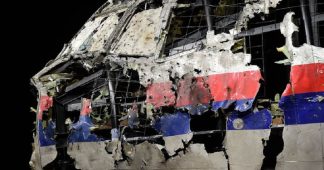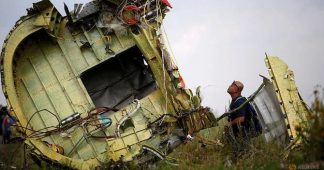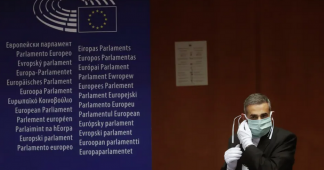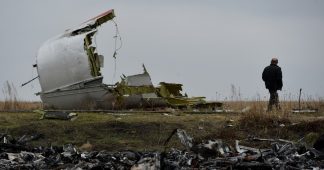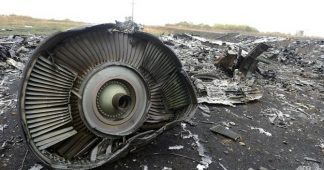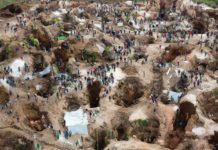By John Helmer, Moscow
Jul. 11, 2021
@bears_with
The US Director of National Intelligence (DNI) never told Dutch prosecutors and investigating judges in the MH17 investigation that he had seen US satellite pictures of the firing of a BUK missile at the aircraft and the detonation which destroyed it in the air above eastern Ukraine seven years ago, on July 17, 2014.
Instead, he told a junior member of his staff, Army Colonel Kenneth Stolworthy, to give the Dutch a paper “summary” that “reflects the American intelligence community’s considered opinion” that “Russian led separatist fighters and Russian military personnel or a combination of the two” were responsible for the attack which killed all 298 passengers and crew on board. The summary Stolworthy was told to assemble came down to him from the National Intelligence Council (NIC), a committee reporting to the DNI the intelligence it gathered from all US intelligence sources, resolving – if it could – the different measures of opinion each of them expressed.
The NIC reported upward to DNI; DNI issued his order downward to Stolworthy with NIC’s script for the Dutch, minus the details.
Stolworthy was selected because he was not an intelligence officer himself; because he had no expertise in satellite imaging; because he was so junior his name was unknown; and because what he wrote to the Dutch was deniable by his superiors if the Dutch challenged his veracity or if there was a leak. Stolworthy was ordered to speak to no one, especially not the Dutch.
In advance agreement between senior officials of the Obama Administration and Prime Minister Mark Rutte’s government in The Hague, the Dutch agreed to accept the DNI script and not to press for the satellite images. Rutte also agreed to keep that more secret than the US evidence itself because he knew there were no US satellite images. Rutte knew this because he had been told so by the head of the Dutch military intelligence agency Major-General Onno Eichelsheim.
The chairman of the US National Intelligence Council (NIC), Greg Treverton, at the time the third-ranking official in the Office of the Director of National Intelligence (ODNI) and the official in charge of assembling “the American intelligence community’s considered opinion”, now says “we worked on the shoot-down, but I don’t recall any specific request for information from the Dutch.”
According to Treverton, speaking two days ago, “Ken Stolworthy was, I think, a deputy National Intelligence Manager, so he did work for the DNI”. He “could have represented US intelligence to the Dutch though I don’t have any notes or memory of any such contact”.
Only one US official has ever claimed to have seen satellite images of the missile shoot-down. That was the Secretary of State at the time, John Kerry.
In fact, Kerry didn’t say he had seen the images himself. He announced on television on July 20, four days after the shoot-down: “You know, I’m a former prosecutor. I’ve tried cases on circumstantial evidence. It’s powerful here. But even more importantly, we picked up the imagery of this launch. We know the trajectory. We know where it came from. We know the timing. And it was exactly at the time that this aircraft disappeared from the radar. We also know, from voice identification, that the separatists were bragging about shooting it down afterwards.”
Kerry also said: “We know that they had an SA-11 [BUK] system in the vicinity, literally hours before the shoot-down took place. There are social media records of that. They were talking, and we have the intercepts of their conversations, talking about the transfer and movement and repositioning of the SA-11 system. The social media showed them with this system moving through the very area where we believe the shoot-down took place, hours before it took place.”

John Kerry’s satellite image allegation, July 20, 2014. Read the transcript. Watch the broadcast. The BUK (SA-11) allegation starts at Min 1:53. The Dutch MIVD reported in secret at the time, and subsequently, that this was a captured Ukrainian Army missile which was inoperable because “the electronics section located in the rear of the unit has been completely destroyed ” – for details, read this.
Kerry repeated the satellite claim only once. He told the press at a meeting with Australian officials on August 12, 2014: “This type of weapon, all the evidence of it was seen on our imagery. We saw the take-off. We saw the trajectory, we saw the hit. We saw this aeroplane disappear from the radar screens. So there is really no mystery about where it came from and where these weapons have come from.”
The mystery of where the attack on MH17 came from can’t be a mystery in the criminal trial launched by Rutte’s government at The Hague District Court. It must decide, according to Dutch criminal law and procedure, if the evidence presented in court will convict four soldiers – three Russians, one Ukrainian – the Russian military command in Moscow, and President Vladimir Putin, of the crime of firing a BUK missile in a pre-meditated act of murder.
If the only evidence of the crime originated with the Ukrainian Security Service (SBU), Dutch criminal procedure and law required the court to rule it inadmissible in the trial preliminaries or subject to reasonable doubt before the trial verdict. The SBU’s evidence was limited to the battlefields of Donetsk and Lugansk, where the US-backed regime in Kiev was fighting a war against regional separatists supported by Russia.
The credibility of the evidence required from the outset that the US Government declare it had non-Ukrainian evidence of the crime. This had to come from the air, not from the ground where the SBU was able to fabricate telephone taps and video images, and manufacture false witness testimony. In the air the Ukraine and Russia were operating radar; that evidence was conflicting and proved no BUK missile attack. Above the radar the US and Russia were operating satellites.
In Washington on July 20, 2014, Kerry claimed that what he knew was “a build-up of extraordinary circumstantial evidence”; twenty-one days later in Sydney, Kerry said the evidence had turned into direct US eyesight of satellite images of the murder weapon and of the crime.
The US decision to announce its satellite evidence proved the Russian crime was taken first by then-Vice President Joseph Biden and the president in Kiev, Petro Poroshenko. It was relayed to President Barack Obama and Secretary of State Kerry. They told the prime ministers of the three countries directly affected by the destruction of the aircraft and of their citizens on board – Malaysian Prime Minister Najib Razak; Dutch Prime Minister Rutte; and Australian Prime Minister Anthony Abbott. Razak said he didn’t believe what he was told and was waiting for investigation of the evidence. Rutte and Abbott began assembling an army to invade eastern Ukraine under US and NATO air cover. Read the book for the full story.
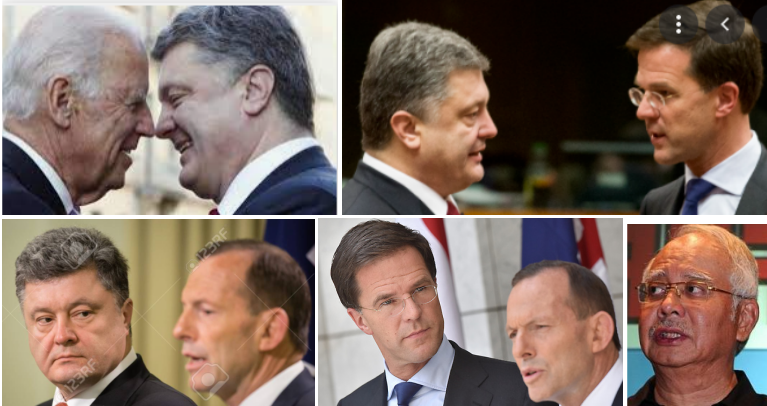
From top left, clockwise: Joseph Biden and Petro Poroshenko; Poroshenko and Mark Rutte; Najib Razak; Rutte with Tony Abbott; Poroshenko with Abbott.
Secret service agents, police and prosecutors from Ukraine, The Netherlands, and Australia had been compiling their case for the Russian crime in what was called the Joint Investigation Team (JIT), created three weeks after the aircraft downing. US satellite and other intelligence was not provided directly to the JIT. This was reported in a private conference between officials in JIT in December 2015. According to the secret minute of their meeting, which has been reported here, the JIT “haven’t received anything from them”.
Instead, the JIT members agreed to depend on the Dutch military intelligence agency MIVD to report on the radar and satellite evidence, and to wait on the special Dutch investigators assigned to deal with the Americans. MIVD, however, reported there was no radar or satellite intelligence from a US or NATO source to corroborate the firing of a Russian BUK missile at MH17 from a location on either side of the Ukrainian border.
An MIVD report of these conclusions was sent to a Dutch official titled the “national prosecutor for counter-terrorism” on September 21, 2016. That official was Simon Minks, a lawyer without military or satellite intelligence expertise; read more about him here. The Dutch have kept his name secret; he has not been called to testify in court.
Minks received the MIVD report concluding there was no US satellite evidence of a Russian missile attack after he had been shown Stolworthy’s report, dated August 23, 2016. Minks and his superiors in the Dutch Government, as well his subordinates in JIT, kept secret the contradiction between the two. Their secret might have been kept from Hendrik Steenhuis, the judge Rutte had assigned to run the MH17 trial, if not for the leaks of the Eichelsheim report and the JIT discussion records.
The Dutch defence lawyer Boudewjin van Eijck first hinted at the possibility that Kerry’s statements were lies in his presentation to Steenhuis on June 22, 2020. At the time, he presented excerpts of videotapes of the former US Secretary of State Colin Powell lying to the United Nations Security Council in February 2003 on what the US claimed was its intelligence on Iraqi President Saddam Hussein’s nuclear weapons threat. That this was a lie, unsubstantiated by the US intelligence agencies, was admitted by Powell in videotaped recordings of 2007 and 2017, which van Eijck also played to the court.
Van Eijck did not challenge Kerry’s truthfulness on MH17, however. Follow van Eijck’s presentations on June 22, 2020, here, and on June 23 here.

Left: Powell’s UN Security Council lie on February 3, 2003; centre, his first disclaimer, June 13, 2007; right, Powell’s admission of November 29, 2017 – “that’s show business, huh”. View the sequence in the courtroom video archive for June 22, 2020, Min 1:19-23.
On June 9, 2020, the Dutch prosecution told the court “in response to the request for legal assistance, a representative of the U.S. Office of the Director of National Intelligence issued a written statement stating, among other things: ‘At the time that MH17 dropped out of contact, the US Intelligence Community detected… an SA-11 surface to air missile (SAM) launch from approximately six kilometers south of the town of Snizhne in Eastern Ukraine.’ The statement included the same image, which had previously been posted on the Facebook page of the US Embassy in Kiev. The National Prosecutor’s Office for Counter-Terrorism, Intelligence and Security Services has been given the opportunity to verify the accuracy of this statement on the basis of the underlying, secret sources.”
Minks was the individual “given the opportunity to verify the accuracy of this statement”. Stolworthy was the ODNI “representative” issuing the written statement. Stolworthy was then named by defence lawyer van Eijck on June 22, 2020, when he formally applied for a court order to question him. Stolworthy’s name wasn’t mentioned in court again until last week when Steenhuis called him the Director of National Intelligence. This attempt by the judge to make Stolworthy more credible was Steenhuis’s mistake; read more.
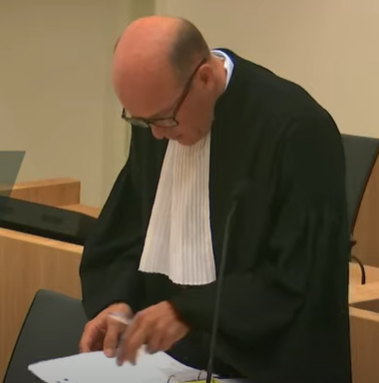
Over the year-long interval between the naming by van Eijck and by Steenhuis neither van Eijck (right) nor his junior on the Dutch defence team, Sabine ten Doesschate, has mentioned Stolworthy’s name. Nor have they read into the open court record what they already have read from the closed prosecution’s case file of the memorandum Stolworthy sent to The Hague on August 23, 2016. A Dutch source who has been in contact with the defence lawyers defends their secrecy with this evidence by claiming “they haven’t started defending their client yet. They will start doing so after they have closed their investigation. Their only contribution thus far in public was trying to get as much information from the Prosecution Service as they can and urging the judge to allow additional investigations.”
The same source says he also knows the woman who has been identified by Steenhuis as the investigating judge who has decided that Stolworthy’s claims and the SBU evidence will be admitted in court, including telephone taps, video and camera images, and prisoners interviewed as witnesses by the SBU. The source refuses to name this judge, or others involved in the secret investigation, until he publishes his book. On the significance of the secret judges dictating to Steenhuis how he should rule, read this.
Steenhuis announced last week that it is “pointless” for the defence lawyers to cross-examine Stolworthy.
Details of Stolworthy’s military career and his role at ODNI remain a secret; there is no sign the Dutch defence lawyers have investigated him. ODNI organisation charts reveal that military officers heading sections of the Office always rank at general or admiral level. Stolworthy is a colonel.
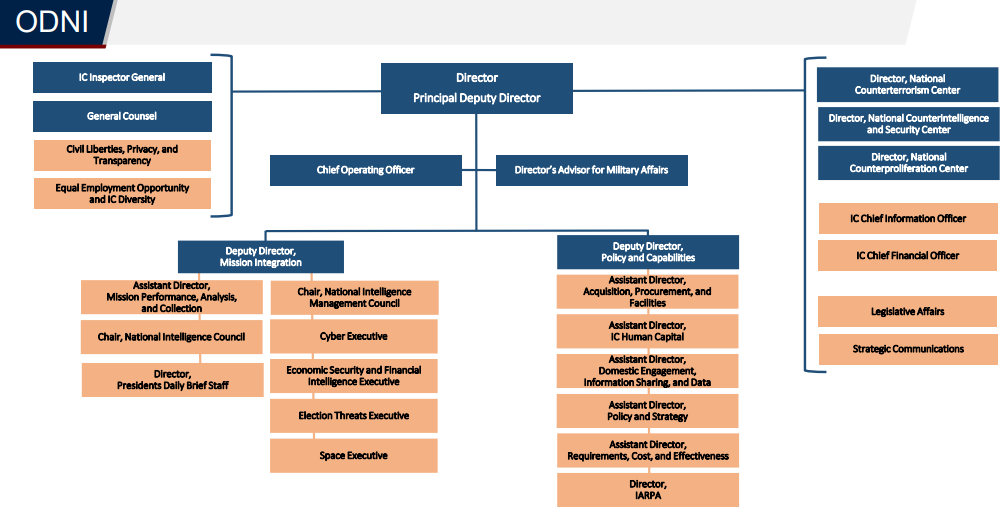
To enlarge and read the current ODNI org chart, click here .
US Air Force General James Clapper was DNI when MH17 was shot down. Under him, the chairman of the National Intelligence Council between July 6, 2014, and July 5, 2017, was Greg Treverton. Treverton, a senior intelligence official since the Carter Administration, didn’t arrive at his NCI office until September 11, 2014. Treverton is now retired from government service, and is a university professor in California.
DNI press releases for 2014 do not mention the MH17 incident. Press releases issued by ODNI in 2016 do not mention Stolworthy. An email request for ODNI to confirm Stolworthy’s rank, role and term at the Office has not been answered.
A Linkedin biography published by Stolworthy himself says he was a “National Intelligence Manager Europe/Eurasia” between 2014 and 2017. He does not claim to speak Russian or any other foreign language. He is also exaggerating his job level.
Treverton was asked to clarify. “Of course we worked on the shoot-down,” he replied, “but I don’t recall any specific request for information from the Dutch. Ken Stolworthy was, I think, a deputy National Intelligence Manager, so he did work for the DNI (but not the NIC), and so to that extent could have represented U.S. intelligence to the Dutch, though I don’t have any notes or memory of any such contact.”
Below the DNI — Treverton was asked — would a deputy manager like Stolworthy have had sufficient authority to sign the report which the Dutch judge has now identified? Treverton replied: “Probably yes, since it seems like the DNI was trying to keep our intelligence support to the Dutch low key.”
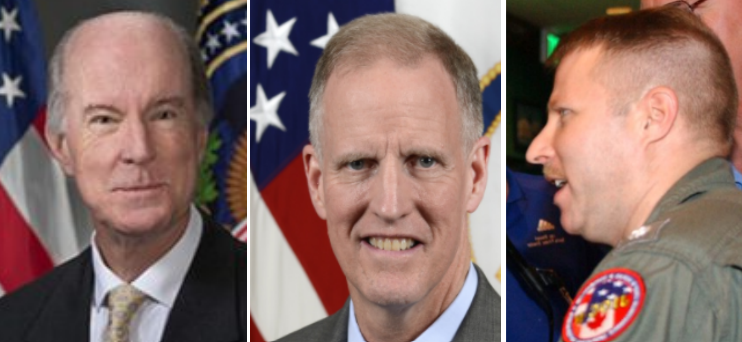
Left, Greg Treverston at NIC in August 2016. Centre, US Army Colonel Kenneth Stolworthy. Right, US Navy Commander Lloyd Cafran.
Stolworthy’s Linkedin profile reveals he was a US Army officer between 1980 and 2007; three years are then missing from his profile until he says he was a deputy assistant director at the Federal Bureau of Investigation (FBI) between 2010 and 2013. From that post he moved in 2014 to ODNI for three years until 2017, when he was assigned the Army’s director of the “Russia Strategic Initiative” at the US European Command (USEUCOM) in Stuttgart. On Monday Stolworthy’s executive officer at his EUCOM office in Stuttgart, Christopher Devries, confirmed Stolworthy’s present title and office location. He intimated that he and Stolworthy were not aware of the MH17 trial references.
Stolworthy was asked to clarify whether, in addition to signing the August 23, 2016, memorandum he had met or communicated directly with Dutch officials to brief them verbally. “Did you personally see US satellite images to which you make reference in your memorandum?” he was also asked. There has been no reply.
For evidence of Stolworthy’s understanding of Russia and what he calls the Russian “invasion mindset”, watch this video of 2019 (starting at Min 52:52).
Russia has not been the only thing on Stolworthy’s mind during his career. In 2004 and 2005 when Stolworthy was posted as the Army colonel in charge of the US Defense Attaché’s Office (DAO) in Zagreb, Croatia, he appears to have come into conflict with a subordinate officer, US Navy Lieutenant-Commander Lloyd Cafran, and Cafran’s wife. Stolworthy has kept mum on his time in Croatia; Cafran has not only published the record of his time there; he has also filed a Freedom of Information Act (FOIA) request for records of the official investigation of “an incident involving DAO [Defense Attaché Office] Col. Kenneth Stolworthy in Zagreb, Croatia, and the requester [Cafran] and his wife”.

Source: https://www.governmentattic.org/

Source: https://www.dia.mil/
The Defense Intelligence Agency report of its FOIA actions in 2005 indicates that Cafran’s request for the investigation of Stolworthy was one of 275 requests, of which 42 were granted; 233 were denied. The outcome for Cafran’s request is not presently known.
In his DAO post at the US Embassy in Zagreb Cafran says he was responsible for “supporting US and Croatian initiative in attaining membership in the North American Treaty Organization”. He was promoted to commander rank, but he remained Stolworthy’s subordinate. Cafran spoke Croatian; Stolworthy didn’t.
Not long after the investigation of the incident between Stolworthy and Cafran’s wife, Cafran was posted out of Croatia to the US Navy intelligence staff in Korea; Cafran did not speak Korean. He was then sent to the North American Aerospace Defense Command (NORAD) in Colorado, where he retired from the Navy in 2011. He is now living with Susan Cafran at an address in Peyton, Colorado, not far from NORAD headquarters.
In 2005, according to the Defense Intelligence Agency’s report of 275 FOIA requests filed and processed that year, including Cafran’s, just 42 were granted. Stolworthy was asked to clarify what had happened; he did not reply.
It has so far been impossible to contact Cafran and request his assessment of Stolworthy’s veracity. But from Stolworthy’s time in Zagreb that is already known to Dutch military intelligence; also to the Russian military intelligence agency, GRU
Published at johnhelmer.net
